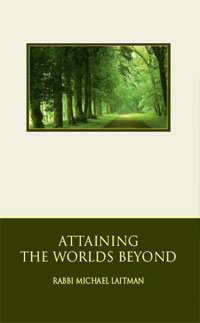Applying the Right Effort Towards Spirituality
Although we think we made huge efforts towards the right goal, the quantity, our quality of those actions could be insufficient, or we missed the direction towards the goal completely.
We can observe similar events in nature. For instance, it can rain extensively, but not in the places where the rain would yield the greatest benefit. Thus, the rain may fall in the desert, where it produces little effect, rather than in the fields, where even the slightest precipitation can give rise to a variety of crops.
Similarly, a person can be engaged in the constant reading of spiritual texts, but the fruits, the spiritual understanding of the Creator that should result from these efforts, may be elusive. On the other hand, it is possible that by investing a much smaller effort in studying the right portions of Kabbalah, one may reap a greater harvest from one’s efforts.
The same can be applied to the study of Kabbalah. If the entire process of studying is dedicated to the search for the Creator, rather than to the mere accumulation of knowledge, then the whole life-bearing effect of Kabbalah is rendered in the proper place.
But if the person is studying only to receive greater knowledge or, even worse, to display and take pride in the intellect, even Kabbalah will not yield the right results. In this case, it can, however, reveal the proper goal of studying, and thus help focus efforts in the right direction.
Egoism’s Magnification Along the Spiritual Path
In the Bible, Egypt symbolizes the supremacy of our egoism (it is thus known as Mitzraim, from the words mitz-ra, the concentration of evil). Amalek represents the tribe that waged war against Yisrael (derived from yisra, straight, and el-Creator, that is, those who want to steer themselves directly to the Creator).
Amalek personifies our egoism, which under no circumstances wants to permit a person to become free of its power. Egoism is displayed (attacks) only in the desires of a person who attempts to depart from the Egyptian captivity (egoism). Even if one is situated at the very beginning of one’s path, Amalek will immediately bar that individual’s passage.
A sudden increase in perceiving one’s egoism is sent only to those who are distinguished and chosen by the Creator.
Only those who are selected in order to attain a higher understanding of the Creator are sent the Amalek. This is intended to invoke in these people a real need for the Creator, rather than a mere need to improve their personal qualities, or simply to “become good people.”
Fostering a Bond with the Creator
An individual, so chosen, begins to experience great difficulties in the realm of self-improvement. The desire to study, which was so strong in the past, suddenly wanes. The body becomes heavy when faced with actions it must take. The struggle with the body (the intellect, our “I”) focuses on the body’s desire to understand who the Creator is, where the body should go and why, and whether the body will benefit from each of the efforts.
Otherwise, without any benefit, neither the mind nor the body will have any energy or motivation to do something. And in this they are correct, since it is silly to carry out actions without knowing, in advance, the outcome.
These desires are opposite in nature to those of our world, since everything that we perceive and sense, and everything that creates the picture of “our world,” is the product of our egoistic intellects and our egoistic hearts. Thus, only through the process of replacing the existing notions with opposite notions (faith replacing reason, and “giving” replacing “taking”), can we enter the spiritual world.
But since we only possess those tools that we were originally created with, intellect and egoism, and since our intellect works only for the benefit of our egoism, we cannot produce the different tools of reason and perception internally. These must be obtained from the outside, from the Creator.
For this reason, the Creator draws us to Himself, showing us in the process that we are unable to alter ourselves without His help. Even though the body refuses it, we must search for, and foster, a bond with the Creator, because only this bond will facilitate our spiritual redemption.
Acquiring an Increasingly Higher Reason
We should not ask the Creator for the ability to see and experience miracles, falsely believing that this experience will help us overcome the self and bring an appreciation of the grandeur of the spiritual, rather than simply being overtaken by blind faith.
Kabbalah warns against such thinking when it tells the story of exodus from Egypt: When Amalek attacked the people, Moses defeated them only by raising up his hands and asking for the power of faith.
In the process of spiritual ascent, we constantly acquire a higher reason that increases with each attained level.
As a result, we must constantly increase the power of our faith, so that it is always greater than the power of the intellect; otherwise, we may once again come under the influence of egoism.
This process continues until we are clinging only to the Creator. In the final stage we attain the ultimate understanding, the utmost reception of Light (Ohr Hochma) without any gradations. It is described as “the Light that was created in the first day of creation, in which (light) the first man saw from one end of the world to another end;” and in Kabbalah, it is said: “at the beginning of creation, everything was engulfed in the highest Light.”
In other words, when the Light shines on all, without distinguishing the levels, then everything becomes clear. There is no beginning or end to this Light, there are no shades, and everything is absolutely comprehensible.
 “How to Qualitatively Advance in Spirituality” is based on the book, Attaining the Worlds Beyond by Dr. Michael Laitman.
“How to Qualitatively Advance in Spirituality” is based on the book, Attaining the Worlds Beyond by Dr. Michael Laitman.

